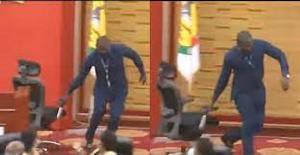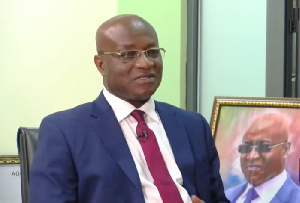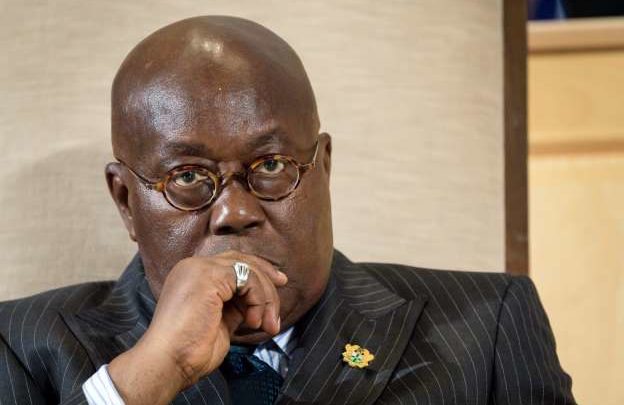What may have spurred the Western Togoland turf war – Awoemefia’s Spokesperson hints

The whole brouhaha about a separation and eventual creation of an independent nation, may have emerged as a result of cumulated feelings of marginalization by some sections of the Volta Region the Spokesperson to the King of the Anlo State, Togbi Sri III has suggested.
Though Tobgi Kumassah maintains that the Anlos have never been a part of Togoland and have neither joined in the breakaway efforts over time by the secessionists, he however believes their actions might have some rooted reasons.
Speaking to GhanaWeb in an exclusive interview, Togbi Kumassah said, “The treatment given to Voltarians, we seem to be marginalized. That might be one reason. That we feel that the way we are being treated as aliens, on our own land by some people, in authority, makes the people feel like when they are on their own, it will be better.”
The Agbotadua to the Togbi Tay Agbozo stool was however emphatic about the fact that not all Ewes are involved in the demands for a separation.
He, among other things, explained how some members of Ewe groups including Ho and Kpando who voted during the 50s for a separation, couldn’t have their demands met because they were in the minority.
The Anlos however, he insists, were already a part of the Gold Coast before the plebiscite, hence, “couldn’t have been a part of the process back then.”
“Togoland was a mandated territory. The French and British Togoland were one under the Germans. When Africa was partitioned in Berlin in 1884, Togoland was given to the Germans but during the first World War; 1914 to 1918, Germany was defeated and the colony was taken from them.
“Because it was a colony taken out of war, it was divided into two; French and British Togoland, but the boundary does not include Anlo. Anlo became part of the Gold Coast in 1874. But the first World War came in 1914, so we were already part of the Gold Coast. Just Kpetoe area, to Kpedze, they were the former German colony now called British Togoland.
“So Papavi Hogbedetor, including Anlo as part of Western Togoland is not correct.
“We were never part of German colony, the Germans never ruled us. The only thing is that they brought education and church; the E.P is a German church and the church also opened schools. That was how far they went. The boundary is in Lome – Aflao so we were never part.
“They were mixing Western Togoland with “Eweto”. “Eweto” is an organization comprising all the Ewes, from Ghana, Togo, Benin and Badagre; they are all Ewe-speaking people. Our elders, Sylvanus Olympio; the first president of Togo who was assassinated, they were the brain behind the “Eweto” but we are not part of the Western Togoland.
“When they did the plebiscite on May 9, 1956, it was the Ho, Kpando and Kete Krachie people from the Volta Region. Anlos were not part. If we were part, there should be another plebiscite here.”
According to Togbi Kumassah, the other groups aside Kpando and Ho which were part of the voting leading to the plebiscite, may have chosen to join the then Gold Coast because most of their kingsmen and ‘brethren’ were already in the Gold Coast, hence they felt more comfortable joining. He believes the Ewes who wanted a separation may have wanted to do so because of their affiliation to the Ewe-speaking Togolese.
“Sometimes they justify it by saying that if you add our number to Kpando and Ho, they would have won because the decision was based on majority, the reason being that we the Anlos, Ewes, majority of us are in the Togo territory, and the North; Dagomba and others, majority of them were in the Gold Coast,
“When they voted, either to join their brothers in the Gold Coast or to remain, naturally, they will like to join their brothers. We have our brothers in Togo, so if you asked, they would like to join their brothers in Togo, so that is why you find the Ho people, majority of them saying, they didn’t want to go to the Gold Coast. Kpando people also. But Kete Krachie people, because most of them were at the Western side of the Volta region and majority of them were Akans, they decided to go by the Gold Coast,” he further explained.
Background:
Secessionist group, Homeland Study Group Foundation (HSGF) has, since Friday dawn, been in the headlines after ceasing Juapong, a town in North Tongu District of the Volta Region.
HSGF claims that Western Togoland was an independent state before it was forced to join Ghana after the 1956 plebiscite.
Per their demands, Volta and Oti regions, parts of Northern Region, North East region and Upper East Region will become part of a new Western Togoland state.
The group also captured three personnel of the Ghana Police Service after attacking the Aveyime and Mepe Police Stations.
One member of the group was killed while three other members of the group and the Police Commander at Aveyime were injured during an exchange of fire between the secessionist group and security agencies.
The joint Police and Army team, however, succeeded in arresting 31 members of the group
Meanwhile, analysts have said that the prosecution of those arrested is the only way to settle the controversy.
Source: www.ghanaweb.com





